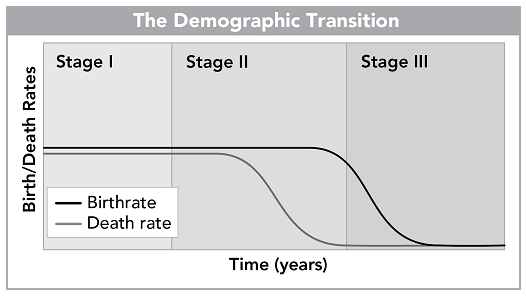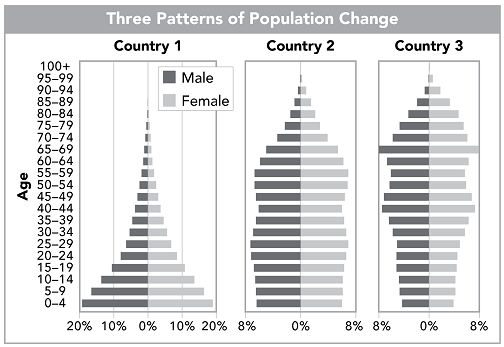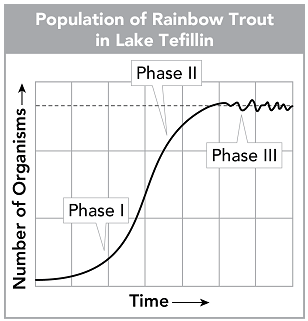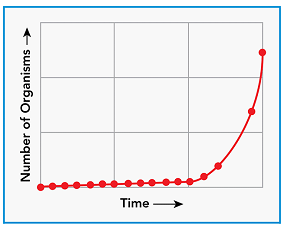
Chapter 5 Study Guide
Assessment
•

Jason Couch
•
Biology
•
10th Grade
•
103 plays
•
Hard
Improve your activity
Higher order questions
Match
•
Reorder
•
Categorization
.svg)
actions
Add similar questions
Add answer explanations
Translate quiz
Tag questions with standards
More options
28 questions
Show answers
1.
Multiple Choice
Brianna is mapping trees in a section of land. She observes that some of the trees are clumped together, some are uniformly separated, and some appear to be spaced randomly. What is she describing?
the population density
the population distribution
the population growth
the population outline
2.
Multiple Choice
Murray is observing a bacterial colony that is growing in agar in a Petri dish. Agar is processed seaweed. Murray calculates that the population doubles in size every 32 hours.
Which conclusion is supported by Murray's observations?
The agar and air in the Petri dish are providing all of the resources needed by the bacteria.
The bacterial colony is growing in all regions of the agar in the Petri dish.
The bacterial colony will continue doubling in size indefinitely.
The agar and air in the Petri dish are limiting factors on the growth of the bacterial colony.
3.
Multiple Choice
A scientist concludes that a population of bison has reached the carrying capacity of the prairie where it lives. The birthrate and death rate of the bison population are equal to each other. What can be concluded about the rates of immigration and emigration?
The rates of immigration and emigration are equal to each other.
The rate of either immigration or emigration is zero.
The rate of immigration equals the birthrate.
The rate of emigration equals the death rate.
4.
Multiple Choice
A rabbit population is affected by parasitism and disease, both of which are density-dependent limiting factors. Which statement describes the effects of parasitism and disease on the rabbits?
Parasites and disease weaken or kill a constant percentage of the rabbit population, regardless of its density.
As the density of the rabbit population increases, parasites and disease weaken or kill a greater percentage of rabbits.
As the density of the rabbit population increases, parasites and disease weaken or kill a lesser percentage of rabbits.
Parasites and disease weaken or kill mostly the youngest and oldest rabbits, and not the rabbits of average age.
5.
Multiple Choice
Scientists have observed the exponential growth of lionfish in the Caribbean Sea. Which of these predictions about the future of the lionfish population is the most likely to occur?
The lionfish population will continue growing exponentially indefinitely.
A limiting factor will cause the growth of the lionfish population to slow down, forming a pattern of logistic growth.
A limiting factor will cause the lionfish population to decline rapidly, and eventually decrease to near zero.
The lionfish population will enter a cycle of increasing and decreasing numbers, typical of many predators and prey.
6.
Multiple Choice
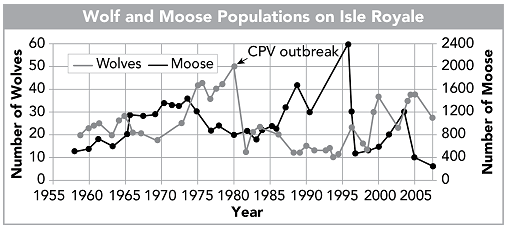
The graph shows the changing populations of wolves and moose in Isle Royale National Park. Wolves are predators, and moose are their prey.
Which of the following pairs of populations is most likely to increase and decrease in a similar pattern to the wolves and moose?
Moose and balsam fir, which are the favorite food plants of moose
Very old wolves and young wolf pups
Moose and the beneficial bacteria that live in the digestive tracts of moose
Male wolves and female wolves

Explore this activity with a free account
Find a similar activity
Create activity tailored to your needs using
.svg)

Ecology Population Vocab Review
•
6th - 8th Grade

Urban, Suburban, and Rural Communities
•
1st - 2nd Grade

Rural, Suburban, Urban
•
2nd - 3rd Grade

Punnett Squares
•
KG

Evolution
•
4th Grade

Survivorship Curves
•
9th - 12th Grade

Population Growth Curves
•
9th Grade

Population Growth
•
9th - 12th Grade
